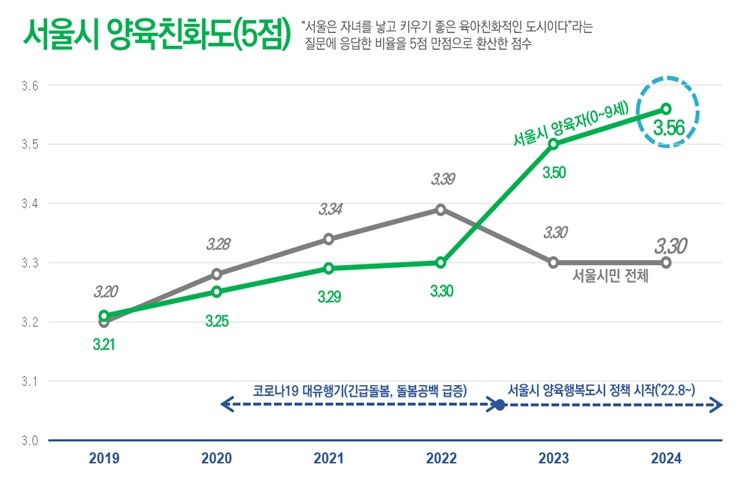The ‘Seoul Project to Encourage Births,’ a policy implemented by the Seoul Metropolitan Government to address low birthrates, has shown positive impacts on citizens’ perception of the parenting environment and the intention to have children. On April 16, the Seoul Metropolitan Government released the results of the ‘Parenting Happiness City Policy Performance Evaluation’ for detailed projects initiated in 2023.
This evaluation serves as a midterm check for the second year of the ‘Seoul Project to Encourage Births,’ which started in August 2022. It was designed by Seoul Research Institute’s policy advisory group and 27 field experts, who conducted a comprehensive analysis using the Seoul Nurturers Survey (1,610 participants), beneficiary surveys (2,540 participants), and various administrative statistics. Out of 19 performance indicators, 16 received excellent ratings. The effect of the flagship projects was calculated by cross-analyzing consumer responses using expert evaluations and the Coarsened Exact Matching (CEM) method.

The parenting friendliness score increased to 3.56 out of 5 points, higher than the 3.30 points recorded before the project’s implementation in 2022. Previously, caregivers’ evaluations were lower than the general public’s, but in the 2023 survey, caregivers scored higher, demonstrating an actual improvement in perceived environments.
The birth intention indicator also improved. For childless couples, the intention to give birth rose from 56.5% in 2023 to 68.5% in 2024, while for couples with children, it increased from 27.3% to 30.3%. The difference was more significant between those with and without policy experience. Among childless couples, 65.7% of the inexperienced and 90.9% of the experienced expressed an intention to have additional children. For couples with children, the figures were 16.2% and 36.9%, respectively, indicating the policy’s substantial influence on birth decisions.
The major initiatives that received high performance evaluations include Seoul-style babysitting fees, 24-hour emergency childcare, mom-and-dad taxis, dinner support in daycare centers, and Seoul-style housekeeping services. All these projects scored above 3 points in expert evaluations, and CEM analysis confirmed their significant effects.
Recommendations from field experts were also provided. In the safe childcare sector, the expansion of Seoul-specific specialized projects was suggested, while for convenient outings, it was advised to continue direct initiatives like kid cafés and mom-and-dad taxis, but establish a system foundation through legal and ordinance amendments for facility creation. In the work-life balance sector, preventing career interruptions should be prioritized, and local government roles such as support for small business owners and the expansion of male parenting participation should be emphasized.
Seoul plans to further refine its policy analysis system and investigate the actual parenting conditions of self-employed and freelancer households, aiming to enhance the reliability and applicability of policy effect analyses.
Kim Sun-Soon, the Director of Women’s and Family Affairs at the Seoul Metropolitan Government, remarked, “The project has made meaningful progress in improving both the perception of the parenting environment and birth intentions since its implementation.” She added, “Based on these achievements, we will thoroughly prepare for Season 2.”